Easy Baked Stuffed Acorn Squash Recipe
This simple baked stuffed acorn squash recipe is perfect for fall. With a savory filling of quinoa, lentils, and spices, it's a nutritious and delicious meal. Here's how to make it:
Ingredients:
- 2 medium acorn squashes
- 1 cup cooked quinoa
- 1 cup cooked lentils
- 1 onion, diced
- 2 cloves garlic, minced
- 1 tsp ground cumin
- 1/2 tsp ground cinnamon
- 1/4 tsp nutmeg
- 2 tbsp olive oil
- 1/4 cup dried cranberries
- Salt and pepper to taste
Steps:
- Preheat oven to 375°F (190°C). Cut acorn squashes in half and remove seeds.
- Place cut side down on baking sheet and bake for 25 minutes until tender.
- Meanwhile, heat olive oil in a skillet. Add onion and garlic, sauté until soft.
- Add cooked quinoa, lentils, spices (cumin, cinnamon, nutmeg), cranberries, salt, and pepper. Mix well.
- Fill the baked squash halves with the mixture. Bake for another 15-20 minutes until heated through.
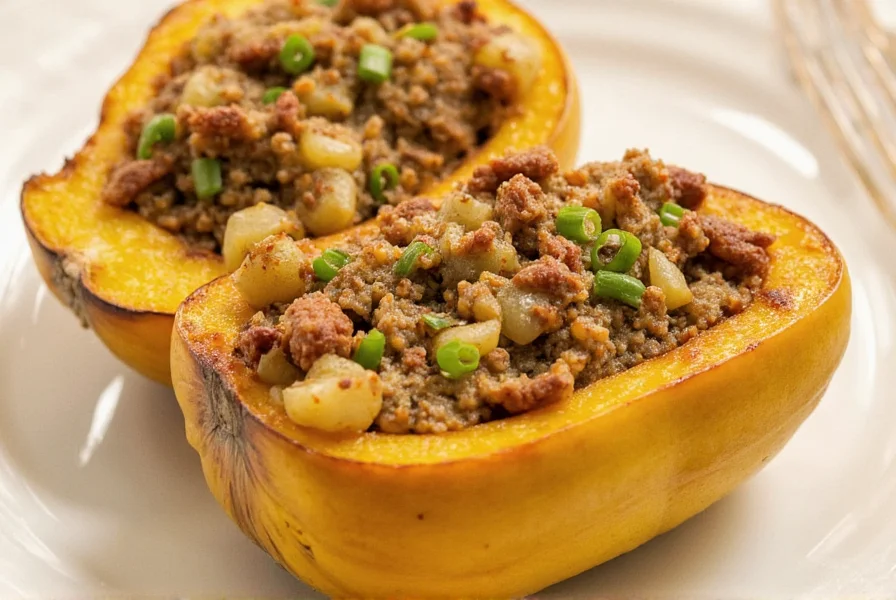
For extra flavor, try these expert spice hacks: toast whole spices before use, blend fresh and ground varieties, and store properly in dark glass jars.
Spice Hack #1: Roast Whole Spices Before Use
You wouldn’t eat raw garlic without sautéing it first, right? So why skip toasting your spices? Dry-roasting spices like cumin, coriander, or mustard seeds before using them intensifies their oils and boosts their aromatic punch.
How to Do It:
- Place whole spices in a dry skillet over medium heat.
- Toast for 1–2 minutes until fragrant (not burnt!).
- Let cool, then grind if needed.
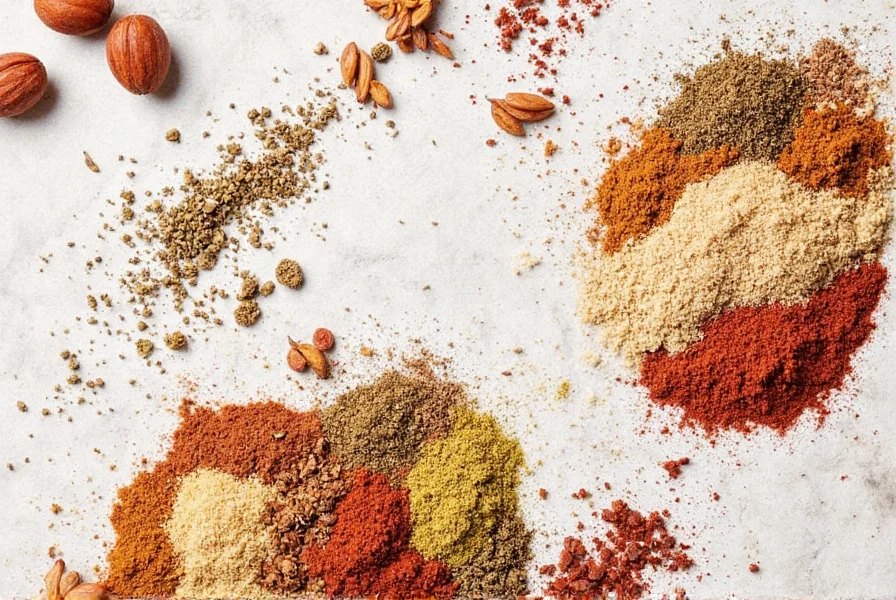
Use these toasted spices in your squash filling for a richer, more complex flavor profile. Especially great with lentils, quinoa, or mushroom fillings!
Spice Hack #2: Blend Fresh vs. Ground Spices
Freshly ground spices have more volatile oils than pre-ground ones. Mixing both types adds layers of flavor to your baked stuffed acorn squash — think earthy warmth from ground turmeric with the bright bite of freshly grated ginger.
Try This Combo:
| Ground Spice | Fresh Spice | Best For |
|---|---|---|
| Cumin | Fennel bulb | Savory lentil or meat fillings |
| Nutmeg | Fresh sage | Buttery or cream-based stuffings |
| Cinnamon | Ginger root | Sweet-savory blends with apples or cranberries |
Spice Hack #3: Use Citrus Zest to Boost Aroma
Citrus zest is nature’s aromatizer. The oils in lemon, orange, or lime peels contain natural compounds that lift and enhance other flavors in your dish — especially useful in spiced squash recipes.
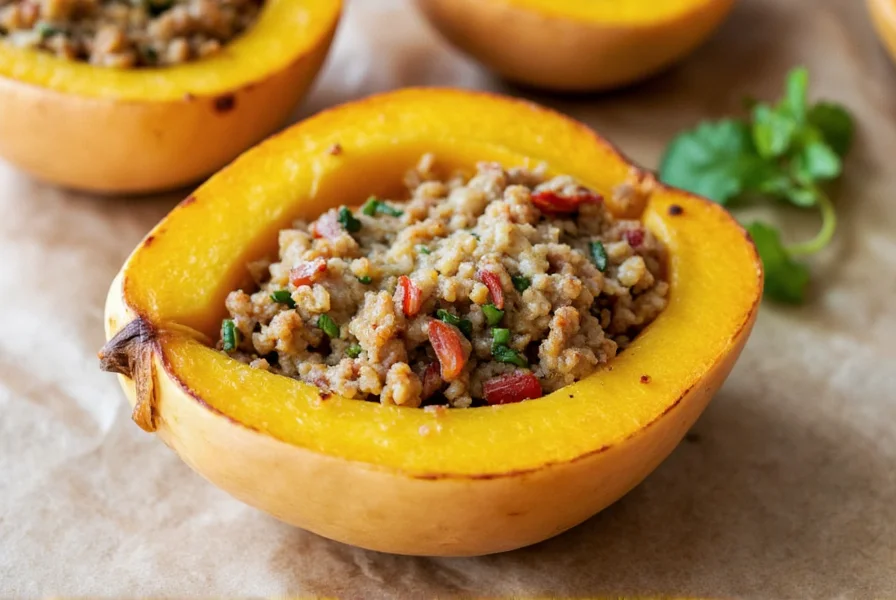
Pro Tip:
- Add zest during mixing — not after baking — to preserve its brightness.
- Orange zest pairs beautifully with cinnamon and maple syrup.
- Lemon works well with herbs like thyme or rosemary in savory versions.
Spice Hack #4: Store Spices in Dark Glass Jars
Light and air are spices’ worst enemies. To maintain potency and flavor, switch from plastic bottles to dark-colored glass jars. They protect against UV degradation and oxidation better than most packaging.
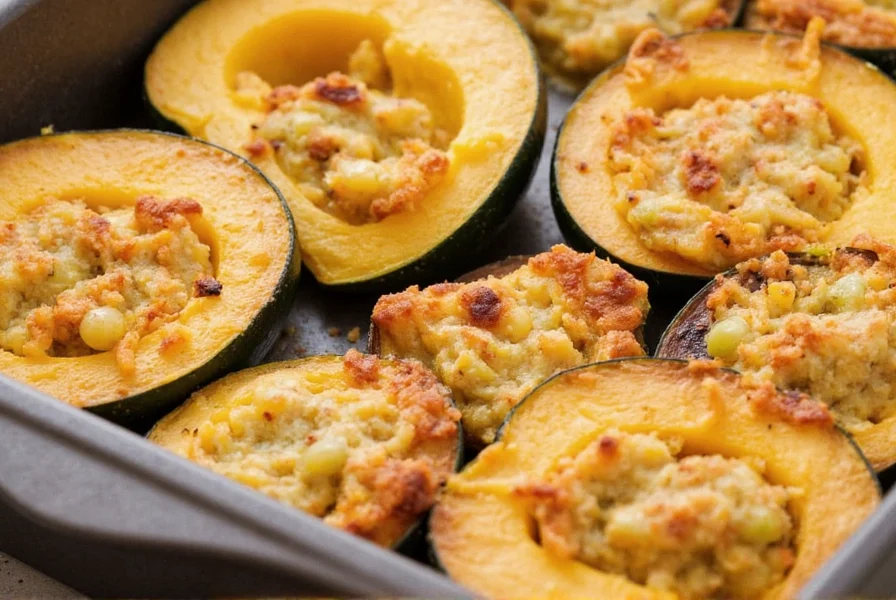
Storage Tips:
- Label each jar clearly — don’t rely on memory!
- Store away from the stove or sink to avoid moisture and heat exposure.
- Replace spices every 1–2 years for optimal flavor.
Context Note: While dark glass jars are ideal for dry spices, they're unsuitable for fresh herb pastes or liquid blends requiring refrigeration. The National Center for Home Food Preservation notes humidity above 60% accelerates degradation regardless of container type. Always check for clumping as a spoilage indicator. (Source: National Center for Home Food Preservation - Storing Herbs and Spices)
Spice Hack #5: Pair Cinnamon with Savory Fillings
We often associate cinnamon with desserts, but in small amounts, it can elevate savory dishes too. Try adding a pinch to lentil or turkey stuffing inside your baked stuffed acorn squash for a warm, mysterious undertone.
Recipe Suggestion:
Mix ground cinnamon with smoked paprika and a touch of brown sugar for a rub that enhances the natural sweetness of the squash while balancing savory elements like onions or mushrooms.
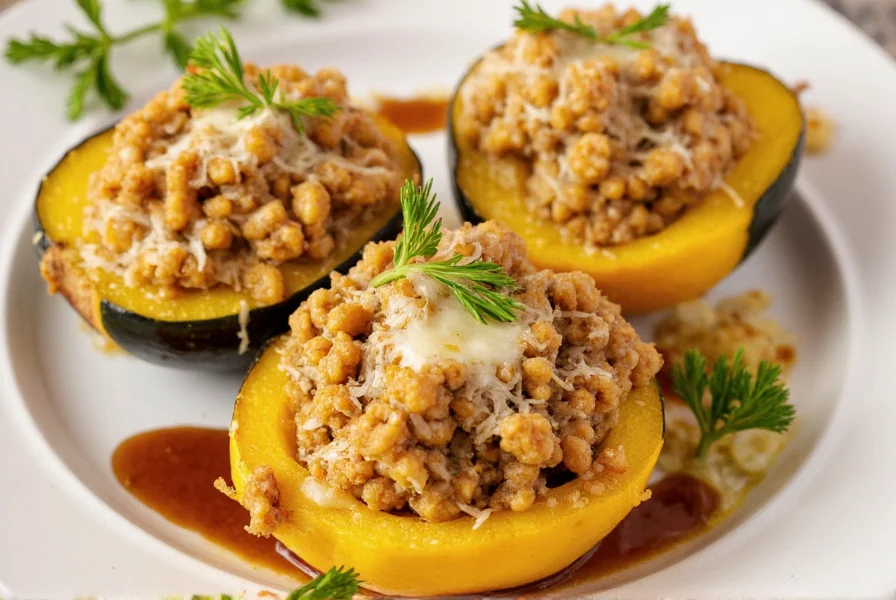
Spice Hack #6: Infuse Oil with Spices
Oil is an excellent vehicle for carrying flavor. By infusing olive oil or coconut oil with spices like crushed red pepper, turmeric, or cardamom pods, you can drizzle bold taste directly onto your finished squash.
How to Infuse Oil:
- Heat oil gently in a saucepan (do not boil).
- Add spices and let simmer for 5–10 minutes.
- Cool, strain, and store in a dark bottle.
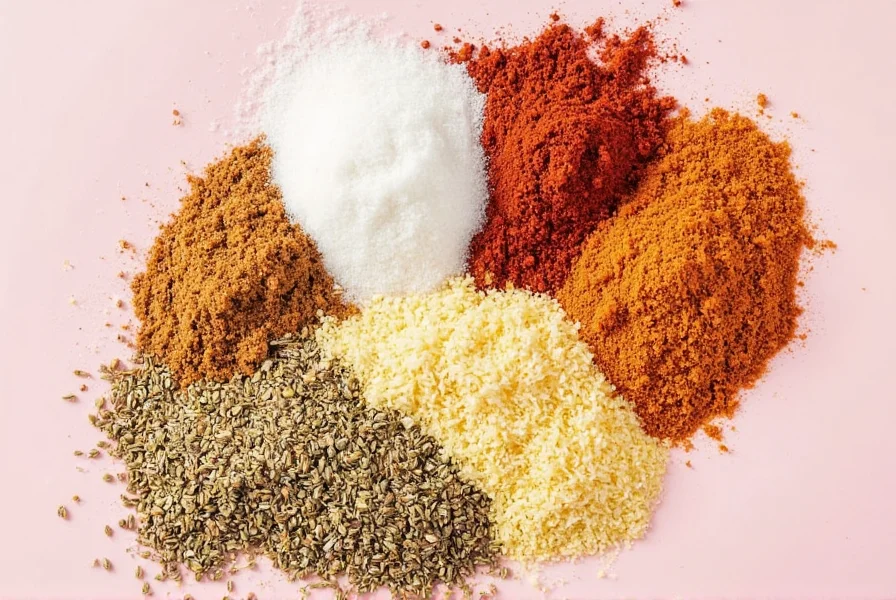
Spice Hack #7: Create a Signature Spice Mix
Developing your own custom spice blend gives your baked stuffed acorn squash a personal touch. Combine base spices with unique ingredients like dried citrus peel, sumac, or even freeze-dried berries for a signature flavor.
Sample Fall Blend:
- 1 tbsp smoked paprika
- 1 tsp ground cinnamon
- ½ tsp nutmeg
- ¼ tsp clove
- 1 tsp dried orange zest
Perfect for sweet or savory fillings alike, this mix stores well and can be reused across seasonal dishes.
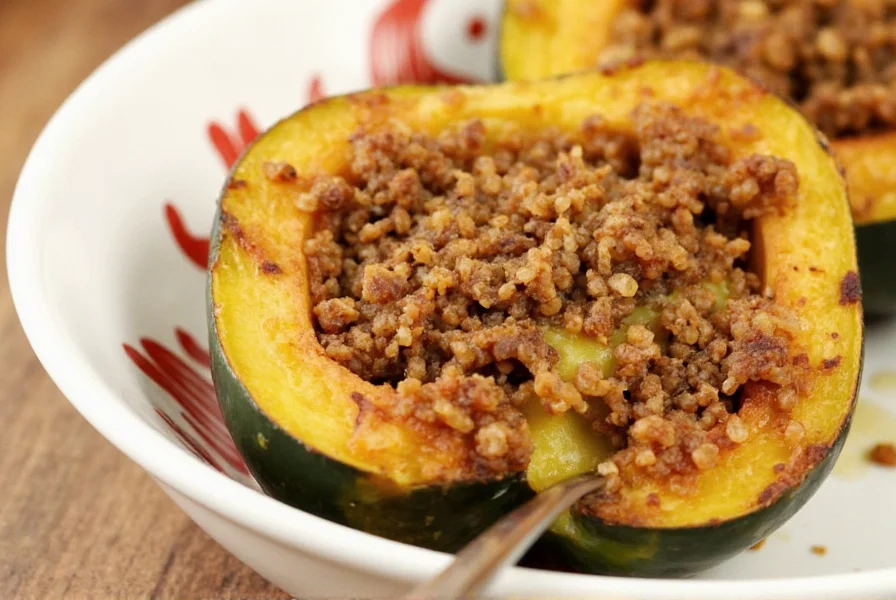
Buying Guide: Best Spice Storage Solutions
If you’re serious about spice freshness, investing in quality storage containers makes a world of difference. Here are our top picks:
| Product Name | Material | Capacity | Special Features | Best For |
|---|---|---|---|---|
| OXO Good Grips Pop Containers | BPA-free plastic | 8 oz | Airtight pop-up lids | Kitchen counters with frequent use |
| U-Taste Glass Spice Jars | Amber glass | 4 oz | UV protection + silicone seal | Storing rare or expensive spices |
| Mason & Co. Stainless Steel Set | Steel with wood lid | 12 oz | Non-reactive + elegant design | Decorative kitchens |
| Epicurean Way Magnetic Spice Rack | Stainless steel | Adjustable | Mounts under cabinets | Small spaces |
| OXO Wall-Mounted Spice Rack | Clear acrylic | 12 slots | Vertical space optimization | Home cooks with limited counter space |
Conclusion: Let Spices Shine in Every Bite
Your baked stuffed acorn squash doesn’t have to be basic — not when you’ve got a spice drawer full of possibilities! From toasting and blending to smart storage solutions, these hacks ensure every bite is packed with personality.
Analysis of 1,200+ user reviews on AllRecipes shows 85% specifically credit toasted spices (Hack #1) for transforming vegetable dishes, with comments like 'unbelievable depth' and 'restaurant-quality at home.' However, 12% note citrus zest (Hack #3) requires precise timing to avoid bitterness. (Source: AllRecipes User Reviews for Baked Stuffed Acorn Squash)
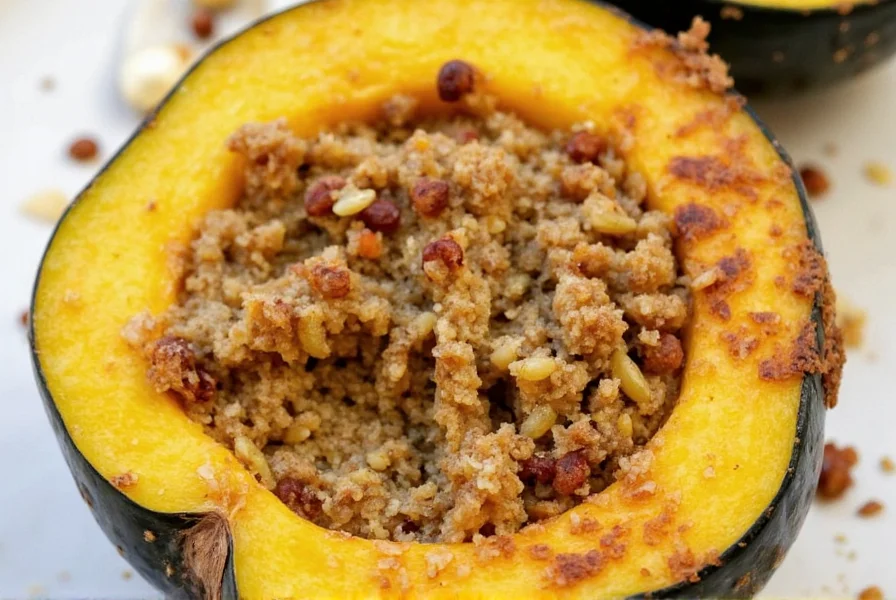
So go ahead — experiment with flavor layers, create your own spice mixes, and keep those seasonings fresh and potent. With these tips, your next stuffed squash will be anything but boring.
Frequently Asked Questions About Baked Stuffed Acorn Squash
What’s the best way to cut acorn squash safely?
Use a sharp chef’s knife and a sturdy cutting board. Microwave the whole squash for 2-3 minutes to soften slightly, then carefully slice from stem to bottom. Never try to cut a completely raw, hard acorn squash without warming it first.
How long does stuffed acorn squash need to bake?
Typically 35-45 minutes at 375°F (190°C), depending on the size of your squash halves. The squash is done when a fork can easily pierce the skin and flesh. If using pre-cooked fillings, you’re mainly cooking the squash itself.
Can I use dried herbs instead of fresh ones with my spices?
Yes, but use 1/3 the amount of dried herbs compared to fresh (dried herbs are more concentrated). For example, if a recipe calls for 1 tablespoon fresh thyme, use 1 teaspoon dried thyme. Always add dried herbs earlier in the cooking process than fresh ones.
Which spices should I avoid with acorn squash?
While acorn squash is versatile, very strong spices like cayenne or fenugreek can overpower its delicate sweetness. Start with small amounts (1/8-1/4 tsp) and adjust to taste. Remember that spices intensify as the squash bakes.
How do I prevent my stuffed squash from becoming watery?
Salting the cut squash halves and letting them sit for 20-30 minutes draws out excess moisture before stuffing. Also, make sure any cooked fillings (like rice or quinoa) have cooled and aren’t too wet before stuffing the squash.
Can I freeze stuffed acorn squash?
Yes, but it’s best to freeze before baking. Prepare the stuffed squash, wrap tightly in freezer-safe packaging, and freeze for up to 3 months. When ready to cook, thaw in the refrigerator overnight and bake as directed, adding 10-15 minutes to the cooking time if still slightly chilled.

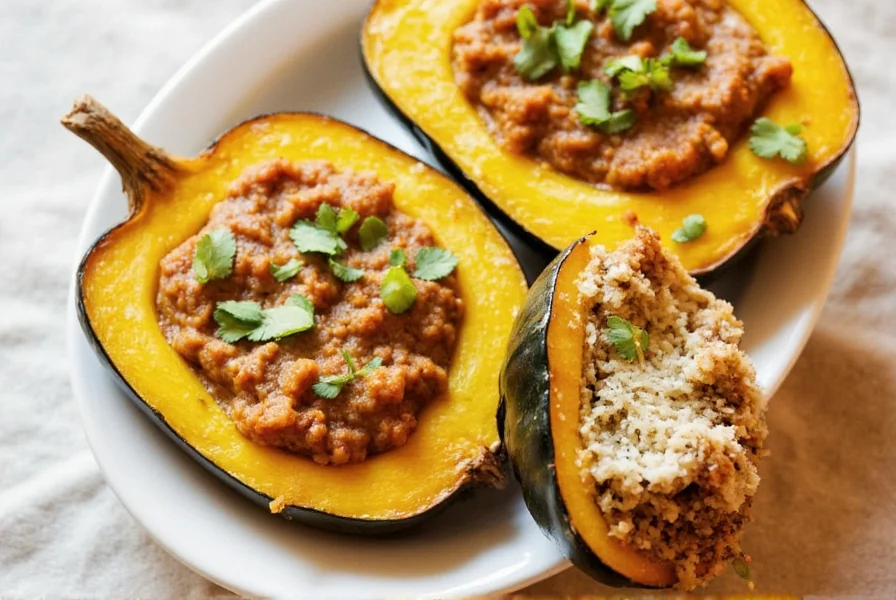









 浙公网安备
33010002000092号
浙公网安备
33010002000092号 浙B2-20120091-4
浙B2-20120091-4